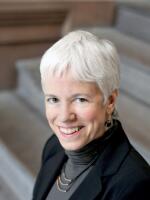The newly reunited New York state Senate Democrats held their first press conference, where they focused on what they said was their number one priority, a package of bills making it easier to vote.
Senate Democrats conducted a survey of eligible voters in New York on their voting patterns. Senate Democratic Leader Andrea Stewart-Cousins says it confirms what she already knew: New York’s voter participation rate is abysmal. The state ranks 41st of all 50 states in the 2016 elections, with a voting rate of 57 percent.
“Unfortunately, New York consistently ranks as one of the worst voting turnout states in the nation,” Stewart-Cousins said. “And that’s embarrassing.”
The Senate Democratic Conference now includes members of the former breakaway Democratic group, the Independent Democratic Conference. The IDC agreed to merge with the Democrats two weeks ago. Former IDC leader and now Deputy Democratic Leader Jeff Klein says voters offered many different reasons for why they find it difficult to get to the polls, like an inability to find child care, or having to work late, or not even knowing that an election was taking place.
“Our survey found overwhelmingly that most people want to vote,” said Klein.
The bills would establish early voting at designated polling sites up to two weeks before a primary, special or general election, including some weekend days. It would also allow mail-in absentee voting for any reason. Currently, absentee ballots are only permitted if a voter has a specific reason, like being out of the state on Election Day or having an overseas military posting. The measures would also extend primary polling hours upstate to 6 a.m. until 9 p.m., instead of noon until 9 p.m., and would require the Boards of Elections to notify voters when there’s a special election.
Blair Horner, with the New York Public Interest Research Group, says the measures are not radical changes, and would simply bring New York up to date with the rules in many other states.
“We have anachronistic laws on the books,” Horner said. “Why does it have to be that you can only vote on the second Tuesday in November, that doesn’t make any sense in the modern age.”
The bills face obstacles to getting on the floor for a vote.
The newly aligned Democratic conference includes two new senators, elected in a special election on April 24. But, even with the additions, the Democrats still have just 31 seats, one short of the 32 required to hold the majority in the chamber. That’s because one remaining Democrat, Senator Simcha Felder, still sits with the 31 Republicans, giving them control of the chamber. Republicans have so far not supported the measures. But Stewart-Cousins says she’s not giving up hope.
“I’ve been watching changes happen here every day,” she said.
Senator Stewart-Cousins says she plans to continue to talk to with Senator Felder, to try to convince him to switch sides and caucus with the Democrats. Felder has said he intends to stay with the Republicans through the end of the session, but he has not ruled out changing his mind.






